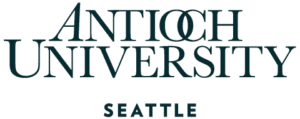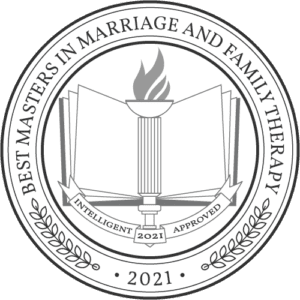Master of Arts
MA in CFT with Art Therapy
Heal through creation.
Add the Art Therapy concentration to your Couple and Family Therapy degree to expand upon your capabilities of improving the lives of others. By pairing comprehensive clinical training with a strong theoretical framework, you will be uniquely positioned to leverage art therapy in a clinical setting. Empower your therapy clients to express themselves verbally and through visual art in order to treat a multitude of developmental, emotional, and psychological problems or disorders.
This degree is offered by Antioch University's Seattle Campus.
Program Overview
The MA in Couple & Family Therapy degree has an Art Therapy specialization combined with Couple and Family Therapy (CFT). You receive comprehensive clinical training, making it one of the few degree programs in the U.S. featuring art therapy with a clinical focus. Antioch University Seattle has held accreditation continuously since 1927. The MA in Couple and Family Therapy with a specialization in Art Therapy is accredited by the Commission on Accreditation of Allied Health Education Programs (CAAHEP) upon the recommendation of The Accreditation Council for Art Therapy Education. Thus, the curriculum meets national standards for art therapy registration.
Licensure Information
This program is designed to lead to state licensure.
Additional Licensure Information
Degree Requirements
Coursework
Antioch University Seattle’s Art Therapy specialization is combined with the MA in Psychology with Couple and Family Therapy (CFT) concentration. The degree offers you comprehensive clinical training for a career as a licensed marriage and family therapist. With a focus on developing multicultural counseling competencies, you accomplish these goals through a combination of required coursework, electives, and a supervised internship. The Art Therapy program is 96 quarter credits. You may begin the program in either spring or fall. Core Clinical Courses:
- Applied Couple Therapy
- Applied Family Therapy I & II
- Beginning Clinical Skills for Couple and Family Therapists
- Competency Assessment I, II, III, IV
- Individual Therapy in the Family System
- Human Development in the Family Life Cycle
- Human Sexuality
- Internship Preparation
- Assessment, Diagnosis, and Treatment Planning in Couple and Family Therapy
- Psychopathology
- Systems Perspectives in Family Therapy
- Theories of Couple and Family Therapy
Core Art Therapy Courses:
- Advanced Art Therapy Assessment
- Advanced Art Therapy Research in Individual and Family Therapy
- Art Therapy in Diverse Settings: Individual and Group
- Art Therapy Master’s Project or Art Therapy Thesis
- Art Therapy Research in Individual and Family therapy
- Developmental and Treatment Models in Art Therapy
- Ethics in Creative Arts Therapy
- Ethics in Family Creative Arts Therapy
- Family Group Art Therapy
- Family of Origin Systems and Creative Arts Therapy
- History and Theory of Art Therapy
- Symbolism, Metaphor, and Creativity
- Multicultural Perspectives and Creative Arts Therapy
- Techniques and Practice of Art Therapy
Elective Courses: One elective in counseling a culturally specific population OR one of the following:
- Abusive Relationships
- Addictions and Substance Abuse
Internship Courses
- AT/CFT Internship I,II, III, IV, and V
- Case Consultation I, II, III, IV, and V
Internship Experience All students participate in an internship in a professional setting. This experience will enable you to validate and clarify the theory you acquire in the classroom as you develop your own role as a clinician. Examples of internship sites include the following:
- College counseling centers
- Community centers
- Group homes
- Homeless shelters
- In-patient psychiatric hospitals
- Jails
- Penitentiaries
- Public mental health clinics
- Youth and family services
Program requirements and course offerings are subject to change. For a detailed curriculum, degree requirements, and course descriptions, please visit the AUS catalog.
Career Outlook
Art therapists work in private practice and/or in clinical, educational, and rehabilitative settings such as:
- hospitals and clinics
- residential treatment centers
- long-term care facilities
- community centers
- prisons
- shelters
- schools
- mental health and social service agencies
Annual Art Therapy Program Retention Rate
- In 2023, the art therapy program had a 88% retention rate.
- In 2022, the art therapy program had a 75% retention rate.
- In 2021, the art therapy program had an 86.96% retention rate.
Art Therapy Program Graduate Positive Employment Placement Rate
The Art Therapy Program is dedicated to preparing students to work in the professional field, which is reflected by the positive employment placement rate of our graduates indicated below:
- 100% of the survey respondents who graduated in the 2022– 2023 academic year reported they are currently working in the field of therapy (Alumni Survey Report 2024, n=11; Knowledge Rate = 73%).
- 92%of the survey respondents who graduated in the 2021– 2022 academic year reported they are currently working in the field of therapy (Alumni Survey Report 2023, n=13; Knowledge Rate = 68%).
- 100% of the survey respondents who graduated in the 2020– 2021 academic year reported they are currently working in the field of therapy (Alumni Survey Report 2022, n=10; Knowledge Rate = 77%).
Admissions / Cost / Aid
Upcoming Events
Recent News
-
The Lived Experiences of Trauma in Autistic Adults: A Thematic Analysis | Dissertation Watch
on April 18, 2025
-
Stigma of Obesity and Healthcare Utilization | Dissertation Watch
on April 14, 2025
-
With Liberty and Justice for All: Psychological and Functional Consequences for Service Members Acquitted of Sexual Assault | Dissertation Watch
on April 11, 2025


